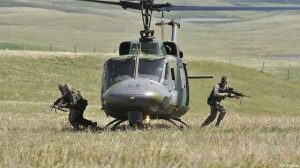
What could justify the Air Force awarding a sole source contract for helicopters worth close to a billion – that’s a thousand millions – dollars? Pick an answer:
- A classified joint service military exercise called Mighty Guardian in which some of the 62 aging UH-1N Huey helicopters failed their assignment to carry security forces to any of 400 widely spaced nuclear missile silos at bases in the northern plains if terrorists attack.
- More than a decade of the Air Force meaning to replace those 62 Hueys but never quite getting around to it.
- Six months of deliberation since Adm. Cecil Haney, commander of U.S. Strategic Command, sent “an urgent letter about the problem to the deputy secretary of defense and the vice chairman of the Joint Chiefs of Staff,” as our colleague John Donnelly of Roll Call put it in a February story revealing that internal alarm bell.
- All of the above.
Whatever the answer, Air Force Secretary Deborah James and other officials confirmed in House Armed Services subcommittee hearings Thursday that the service’s acquisition arm is studying whether replacing 25 of those Hueys has become so urgent it warrants invoking the Economy Act to waive a competition and just go buy something.
“I think it’s urgent,” James assured Alabama Republican Mike Rogers, chairman of the HASC strategic forces subcommittee, who noted Haney’s concern over the issue and the dozen years that have passed since the Air Force recognized the problem. A decision, James told Rogers, is “a couple of weeks away.”
At a tactical air and land forces subcommittee hearing later, California Democrat Loretta Sanchez declared, as she has on similar issues: Not so fast. The fiscal 2017 budget request. she suggested, already contains a sensible, competitive approach to solving the problem without extreme measures.
“The budget request shows a clear path to finally getting at the requirement with a competition that would pick a winner in 2018 and start delivering the helicopters in 2020,” she said. “I know that the Air Force has been pressured by some members of Congress to skip the competition and to give it as a sole source contract to one company. I understand that could speed up the program a bit, but it doesn’t appear to meet any of the normal tests for a noncompetitive contract award.”
Lt. Gen. Arnold Bunch, military deputy to the assistant secretary of the Air Force for acquisition, told Sanchez the Air Force is trying to decide just that: whether a noncompetitive award is justified. “We’ve not made a determination that we’re going to do this way,” Bunch said.
Sanchez had more questions: “How many potential competitors does the Air Force think it might get if this was done as a competition program? Has the Joint Staff approved this as an urgent need, and how do you define that as an urgent need? Is it something like what we saw for our troops who were in Afghanistan and Iraq? If the Air Force does go to a sole source contract, what would be the justification and how big a sole source contract are we talking about?”
The contract, Bunch revealed, would be for 41 helicopters to replace the 25 now assigned to the nuclear security mission. “We would not do it on the remainder of the fleet,” he said, but those 41 might cost “in the $800 million to $900 million range.” As for who might bid if regular order is followed, he said, “We think there are about five” potential competitors. Bunch didn’t name them, but Lockheed Martin’s Sikorsky has suggested a version of its M-model H-60 Black Hawk, Bell has suggested its modern, longer range UH-1Y, Airbus has suggested its UH-72 Lakota, and other alternatives are out there.
Bunch said the Air Force might actually need a month to figure out what to do. We can’t wait.
In a ‘world first,’ DARPA project demonstrates AI dogfighting in real jet
“The potential for machine learning in aviation, whether military or civil, is enormous,” said Air Force Col. James Valpiani. “And these fundamental questions of how do we do it, how do we do it safely, how do we train them, are the questions that we are trying to get after.”


























